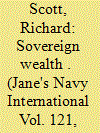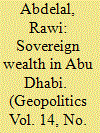|
|
|
Sort Order |
|
|
|
Items / Page
|
|
|
|
|
|
|
| Srl | Item |
| 1 |
ID:
127295


|
|
|
|
|
| Publication |
2014.
|
| Summary/Abstract |
Sovereign Wealth Funds (SWFs) are state-owned investment funds that invest in real and financial assets. Since the global financial crisis in 2008, SWFs' investments have resulted in national security concerns of host countries because SWFs continue to expand rapidly and have become increasingly active in real-time strategic transactions. Given this background, China, which has the biggest SWF in the world, is facing severe challenges of energy resources shortages while its plan is to accomplish social and economic development goals. Energy security is a key driving force of the energy investment policy of China's SWFs. This makes the SWF investments more complicated and more politically sensitive. The combination of sovereign rights and the strategic importance of energy also makes geopolitics more complicated and brings more uncertainty to SWF investments. This article explores the relationship between energy security and energy investments of China's SWFs. It is recognised that the energy investment of SWFs must follow a sustainable path to coordinate energy security, economic growth, return on investment and national security concerns. Government policymakers are urged to balance the financial and political returns on SWFs against potential negative effects. The conclusion presents insights for policymakers, energy scholars and SWF researchers.
|
|
|
|
|
|
|
|
|
|
|
|
|
|
|
|
| 2 |
ID:
150261


|
|
|
| 3 |
ID:
089544


|
|
|
|
|
| Publication |
2009.
|
| Summary/Abstract |
By the turn of the century, oil had already made the tiny emirate of Abu Dhabi rich beyond anyone's wildest dreams. A sovereign wealth fund, the Abu Dhabi Investment Authority (ADIA), has invested extra oil revenues abroad for more than thirty years and amassed a still-growing portfolio worth approximately $750-900 billion. ADIA is widely believed to be the world's largest sovereign wealth fund - indeed the world's largest institutional investor. But Abu Dhabi is not yet a "developed" economy. So, in 2002, the Mubadala Development Company was established as a government-owned investment vehicle. Unlike ADIA's mandate to build and manage a financial portfolio, Mubadala's charge was to develop Abu Dhabi. According to some observers, ADIA was a "sovereign savings fund," while Mubadala was a government-owned investment firm. Mubadala is supposed to invest the wealth of the emirate in activities that would diversify the economy away from energy and into industry and services. Although each Mubadala investment is supposed to earn large returns, the strategy balances financial against "strategic" returns. ADIA and Mubadala are the institutional architecture to manage the wealth of the Abu Dhabi sovereign.
|
|
|
|
|
|
|
|
|
|
|
|
|
|
|
|
| 4 |
ID:
176700


|
|
|
|
|
| Summary/Abstract |
Exhaustible resources and the revenues they generate present a number of broad problems for macroeconomic management. For example, tax revenues can be large and highly volatile, and the stream of revenues is finite. An increasing number of countries now view resource funds and/or fiscal rules for resource revenues as the answer to these challenges. In this paper, we explore the consequences for the UK if past revenues arising from the depletion of subsoil assets had been channelled into a sovereign wealth fund. We show that had a decision been made to establish such a fund in 1975, this could have been substantial in size by 2018 (about GBP 354 billion) and, moreover, would have had a number of benefits such as a reduction in volatility of resource revenues flowing to the Treasury. Crucially, the fund's value would have substantially boosted the size of the government balance sheet, yielding corresponding fiscal benefits. We argue this missed opportunity is underlined further by considering the current debate about shale gas development in the UK. Notwithstanding considerable uncertainties, favourable and optimistic projections for key parameters are required for any shale-based fund to match what we simulate based on past experience for conventional subsoil assets.
|
|
|
|
|
|
|
|
|
|
|
|
|
|
|
|
|
|
|
|
|